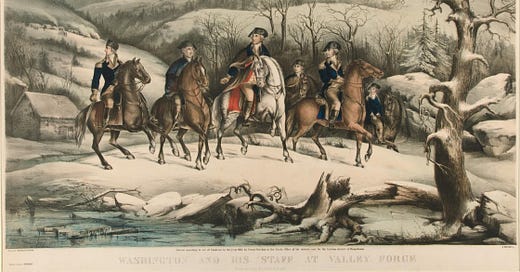TDIH: George Washington’s plea for help
“It is not easy to give you a just and accurate Idea of the sufferings of the Army at large—of the loss of Men on this account,” Washington wrote to the states.
On this day in 1777, General George Washington writes a letter from Valley Forge. The army was struggling, and Washington pled for help.
A copy of Washington’s letter was delivered to nearly every state.
The General wondered if the states would think that he was exaggerating the gravity of the situation. Was his story even believable? But clothes and other supplies were desperately needed. Nearly 3,000 of his 11,000 men were “unfit for duty by reason of their being bare foot and otherwise naked.” That didn’t even count the soldiers who had been “detained in Hospitals and crouded in Farmers Houses for the same causes.”
“It is not easy to give you a just and accurate Idea of the sufferings of the Army at large—of the loss of Men on this account,” Washington wrote to the states. “Were they to be minutely detailed, your feelings would be wounded, and the relation would probably be not received without a degree of doubt and discredit.”
Indeed, mere days earlier, Washington had written the President of Congress that, unless the alarming deficiency of supplies was cured, “[t]his Army must dissolve.”
As Washington wrote his Circular to the States, his army was then just ten days into its stay at Valley Forge. Washington couldn’t then know it, but the bleak situation would get better.
Soon, a group of Oneida Indians would come to Washington’s aid. They set off toward Valley Forge, bringing as many as 600 baskets of corn with them. They stayed long enough to make sure the Americans knew how to cook the tough white corn. Another blessing came in the form of a five-member delegation from Congress. Washington developed a better relationship with that body and obtained several reforms that he wanted. One of these was the appointment of a new Quartermaster General: Nathanael Greene.
Just one year earlier, Greene had performed a little noticed, but vitally important role in keeping the Army stocked as it fled out of New York and across New Jersey. Without Greene, Washington’s army might not have been provisioned well enough to make its Christmas crossing across the Delaware. The important victory at Trenton might never have happened.
Now Greene was in charge of the Commissary Department. He was efficient, and the situation with supplies began to get better.
A final blessing arrived in the form of a Prussian by the name of Baron von Steuben. The Prussian ran training drills and generally helped the American men to develop military proficiency.
The winter at Valley Forge was long and depressing in many respects. And on this day so long ago, Washington would have been focused on the challenges: men who were hungry and barely clothed in the midst of freezing temperatures. But if he could have seen the better trained and more professional fighting force that would emerge from Valley Forge mere months later, surely he would have been heartened.
It’s an age-old problem, isn’t it? Sometimes things are the darkest just before dawn.
Sources can always be found on my website, here.





It took a great leader to keep the men together and Washington was just the man. As a believer in providence I believe he was there for a reason and was Gods man to lead our infant nation.
Your stories give great insight as to the dedication and willingness to risk everything to establish this country. Thank you, Tara.